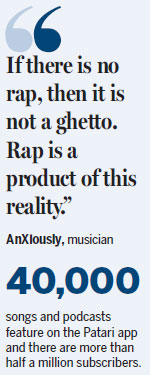Musicians find voices after years of Taliban attacks and gang wars
For years, violence kept most of Pakistan's aspiring young musicians from following their dreams, whether the threat of Taliban militant attacks or gang wars in the crowded southern port city of Karachi.
Now, as law enforcement crackdowns slowly improve the security situation across the nation, some musicians are getting help from two-year old Pakistani startup Patari, a music streaming and production company.
Both the startup and the musicians' efforts are helping to carve out a new creative space for young people in Muslim-majority Pakistan, where those below 30 make up 60 percent of a population of almost 200 million.
Karachi rap ensemble Lyari Underground was once afraid of putting its music on Facebook, deterred by episodes of bloody gang war in the precinct of the same name that many Pakistanis consider the most dangerous in their largest city.
But the same violence has inspired many of the group's songs, taking cues from the music of US rapper Tupac Shakur, said its founder, who uses the name AnXiously.
"In a ghetto, rap exists naturally," he said. "If there is no rap, then it is not a ghetto. Rap is a product of this reality and these surroundings."

Band members said when they first heard the music of Tupac, although half a world away, it reminded them of their own experiences living with violence and poverty.
Lyari remains one of Karachi's poorest areas and financial limitations often force its young people to forego creative pursuits.
Launched in Feb 2015, Patari now boasts a library of 40,000 Pakistani songs and podcasts, and subscribers exceed half a million, said CEO Khalid Bajwa.
Nearly 30 million of Pakistan's people use the internet, mainly on mobile telephones, says digital rights organization Bytes for All.
The company's latest initiative, Tabeer, or "Dream Come True", pairs established artists with unknown musicians to produce six songs and music videos, completed on a budget of $15,000, and features on its app.
Patari exploited the fact that Pakistan's tiny pop music scene comprised a couple of "corporate branded shows" featuring the same artists every year, but excluded amateur musicians.
"We saw an inefficiency in the market, where you have all this talent, all this interest, but there is nothing bridging the two," said COO Ahmer Naqvi.
The first two videos, featuring Abid Brohi, a rapper from remote Sibbi in southwestern Balochistan province, and 13-year-old tea vendor Jahangir Saleem, have drawn more than a million views, matching Coke Studio, Pakistan's premier music program.
Tabeer's sole female artist, Malala Gul, grew to love music as a child, by listening to an aunt who sang songs in the Pashto language spoken across Pakistan's northwest.
Times were tough when she began singing five years ago, in a city roiled by Taliban-led violence.
"Conditions in Peshawar were very bad, but thank God the situation is much better now," she said.
Gul stressed the importance of music, rebuffing those who call it unIslamic.
"This is a big world, and some people will say one thing, others will say another, but anyone who understands and values music will go very far."
|
Singer Malala Gul records a song at a studio in Peshawar, Pakistan. She rejects the claim that the music she makes is unIslamic. Fayaz Aziz / Reuters |
